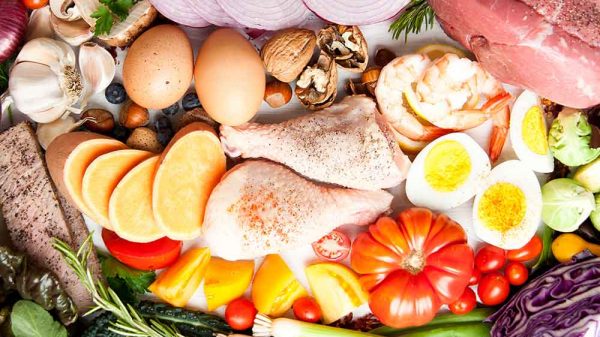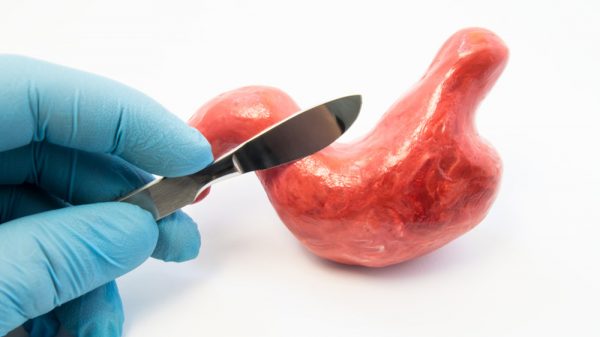The gastric sleeve procedure is a type of bariatric surgery that is intended to help you lose weight. However, as with any surgery, the gastric sleeve procedure also includes a risk for complications during recovery. What are the gastric sleeve complications and how can you prevent them? Keep reading to find out.
What Is the Gastric Sleeve Procedure?
A gastric sleeve procedure – also called a sleeve gastrectomy or vertical sleeve gastrectomy – involves removing a large part of the stomach so that it resembles a sleeve or a tube. When such a large part of the stomach is removed, the stomach lining is unable to produce as much ghrelin, the hormone that is responsible for increasing your appetite. The reduced stomach size and suppressed ghrelin production will markedly decrease your food intake following surgery, facilitating weight loss.
The gastric sleeve is performed as a laparoscopic sleeve gastrectomy, meaning it is not an open surgery. Instead, small cuts are made in the patient’s skin, through which the bariatric surgeon inserts small instruments with a camera, in order to perform the procedure least invasively as possible.
In some cases, the gastric sleeve procedure is combined with a duodenal switch. A duodenal switch includes detaching much of the small intestine and connecting the duodenum directly to the stomach. This prevents a lot of macronutrients and calories from being absorbed, further facilitating weight loss.
The gastric sleeve surgery recovery time occurs in stages. You will be restricted to a liquid diet, before allowing us to eat mashed foods, and finally adding a variety of foods to your diet. Typically, a patient will make a full recovery after about a month. For some patients, the recovery period may be closer to 3 weeks, and for others, it may be closer to 6 weeks. Exact recovery time will depend on each individual case.
Who Is a Candidate for the Gastric Sleeve Procedure?
The gastric sleeve procedure and other weight-loss surgeries are effective therapeutic options for treating morbid obesity and associated metabolic conditions after diet and lifestyle methods have failed. The gastric sleeve surgery is also a less involved alternative to the classic Roux-en-Y gastric bypass procedure while yielding similar results.
Ultimately, your physician and bariatric surgeon will decide whether the gastric sleeve procedure is right for you. Generally, the gastric sleeve procedure is a good option for obese but otherwise healthy patients with a body mass index (BMI) that is 40 or higher.
The gastric sleeve may also be approved for patients with a BMI between 30 and 40 if they also have associated conditions like pre-diabetes, diabetes, sleep apnea, high blood pressure, and fatty liver disease.
Before the procedure, you will need to undergo a rigorous preparation process that gets you ready for the procedure and your new diet and lifestyle following the surgery. The preparation process includes eating a healthy balanced diet, exercising, and losing weight. Your surgeon may also prescribe a very low-calorie diet to help decrease the size of the liver. Going into surgery with an enlarged liver can increase the risk of complications and excessive bleeding during surgery.
Complications After Gastric Sleeve Procedure and How to Prevent Them
Recovering from the gastric sleeve procedure is a long process that requires careful diet guidelines and follow-up care. Many diet and lifestyle changes after gastric sleeve surgery will remain permanent to help you get the most out of the surgery and enjoy health benefits for the rest of your life.
At the same time, complications are possible. Below we’ve compiled possible complications that you may face following the gastric sleeve procedure, as well as ways to prevent them. While many of these complications and prevention strategies may apply to other weight-loss surgical procedures like the gastric bypass or gastric banding procedure, these are meant to be specific to the gastric sleeve procedure.
1. Blood Clots
The development of blood clots is a potential complication that patients may experience in the days following surgery. Many times, blood clots develop due to remaining sedentary following surgery, which causes the blood to pool.
During your hospital stay immediately following your surgery, nurses and health workers will help you move around and walk regularly, to keep your blood flowing. After you leave the hospital, it’s important to continue walking and engaging in regular physical activity as soon as you are medically cleared.
2. Protein Deficiency
Protein deficiency is a feared complication that it is also preventable. Food intake is very restricted, and you are only able to consume liquid or soft foods for several weeks postoperatively. Even after the first month, when more foods can be introduced into your diet, the portion sizes remain very small.
As a result, it becomes extremely difficult to consume an adequate amount of protein from food. Supplements are critical to preventing protein deficiency. Whey protein is often recommended as a supplement to be stirred into milk, water, or smoothies, in order to provide sufficient protein intake.
However, essential amino acid supplements may prove to be superior to whey protein for patients recovering from surgery. Essential amino acid supplements supply all essential amino acids in their pure form, eliminating the need for the digestion of whole protein particles into its individual units. Getting optimal ratios of all essential amino acids allows the body to heal more quickly and maintain muscle more easily.
Research conducted by Arizona State University and the Mayo Clinic in Arizona suggests that supplementing with essential amino acids after surgery may help maintain lean muscle tissue while improving the health status of individuals after bariatric surgery. (1)
3. Other Nutrient Deficiencies
Because of the significant food restriction following the gastric sleeve procedure, nutrient deficiencies in vitamin D, B vitamins, calcium, magnesium, and iron are more likely to arise. Lacking these nutrients can cause unpleasant complications such as slow healing, anemia, and fatigue. To help prevent unpleasant side effects from nutrient deficiencies, it is critical that you take all the supplements that your doctor prescribes.
4. Dumping Syndrome
Dumping syndrome is a fairly common complication that can occur after gastric sleeve procedures, though typically it is not serious. Dumping syndrome is caused by eating too much food or by eating the wrong foods. You can experience symptoms of dumping syndrome within half an hour after eating, or several hours after eating. If you experience dumping syndrome soon after your meal, you will likely experience gastrointestinal distress including nausea, vomiting, diarrhea, and the feeling of being uncomfortably full. Late dumping syndrome usually exhibits as a fast heart rate and feeling weak and dizzy.
Dumping syndrome can be avoided by following the diet that your surgeon and dietitian prescribed for post-surgical care. Aim to eat very small portions and avoid foods that are high in sugar and fat. Sugar seems to be a major culprit of dumping syndrome.
In some ways, dumping syndrome helps prevent the consumption of junk foods, since the unpleasant symptoms become associated with sugar and fat. This association can ultimately become a potent deterrent to consuming high-sugar, high-fat foods.
5. Internal Bleeding, Tearing, or Leaking
In rare cases, the staple line where your stomach was removed and re-shaped could tear. This could result in internal bleeding and gastric leaking. To prevent stretching at the staple line, eat slowly, and consume very small meals. Stop eating when you feel a sense of fullness and avoid drinking and eating at the same time. Consuming too much can put pressure on the surgical site and increase the risk of tearing.
Or, in the case of a duodenal switch, an anastomotic leak may develop between the joining of the duodenum and the stomach. A gastric leak may develop which means stomach fluids and stomach acids leak through the surgical opening. Usually, these complications will come to light soon after surgery, usually within a week.
Gastric leaks are usually accompanied by an infection. You will likely exhibit symptoms like a fast heart rate, abdominal pain, vomiting, and fever. Your surgeon will be able to resolve the issue by draining it or surgically intervening to repair the damage.
6. Bowel Obstruction
A bowel obstruction is a possible complication that can occur after surgery. Usually, bowel obstruction is not caused by the foods you’re eating or your post-surgery care. Rather, research shows that bowel obstruction occurs from kinking at the surgical site or from an internal hernia. (2)
Your bariatric surgeon usually needs to surgically repair the obstruction.
7. Regaining Weight
Weight gain and weight regain is an unwanted situation that may occur months after you’ve healed from your procedure. Usually, weight regain occurs when reasons for overeating have not been completely resolved in the preoperative preparation or the postoperative recovery period. As a result, as soon as the stomach heals, the individual feels inclined to return to old eating habits such as binge eating, consuming too many calories, drinking soda, eating fast foods, and eating foods that are high in fat, added sugar, and sodium.
If dietary guidelines are not followed after the gastric sleeve procedure, it is possible to essentially “undo” the surgery. Eating vast quantities of food will eventually stretch out the stomach to accommodate large volumes of food. The gastric sleeve diet after one year should remain balanced, healthy, and portion-controlled so you can enjoy the long-term health benefits of gastric sleeve surgery.
Therefore, it is critical to delve into the reason behind old eating patterns. A registered dietitian and a therapist can help with strategies for how to handle binge eating triggers, how to control portion sizes, and creating healthy substitutes for your favorite foods.
8. Gallstones
Since the gastric sleeve usually precipitates rapid weight loss following the procedure, this can increase the risk of developing gallstones. When you rapidly lose weight, the liver passes more cholesterol into the gallbladder. The gallbladder may not fully empty, which can lead to the formation of gallstones.
A gallstone attack can feel like a throbbing pain in the abdomen that is usually triggered after a meal. It is most likely accompanied by vomiting, fever, jaundice, and dark urine. If you have a gallstone attack, it possible that you may need to have your gallbladder removed, a procedure called a cholecystectomy.
9. Infection
As with any procedure, undergoing surgery and recovering always carries a risk of developing a postoperative infection. Though you will likely receive a course of antibiotics following your surgery, it is still possible to develop an infection after the course of antibiotics is completed.
10. Heartburn
Heartburn is a common complication following gastric sleeve surgery. Though gastroesophageal reflux disease (GERD) is a condition that occurs with obesity, it is also common to develop GERD after surgery, if heartburn becomes more regular. The risk for heartburn and GERD increases after surgery since the stomach is now drastically smaller in size. This means that stomach acid is in closer proximity to the esophagus and can more easily make its way up the esophagus to cause burning and inflammation.
Sticking to post-surgery guidelines for portion sizes and foods is vital to help prevent the development of GERD.
Be on the Lookout for Symptoms
After your surgery, stay vigilant in following all guidelines and stay attuned to your body. If you notice worrisome or unusual symptoms, or if symptoms persist, it’s best to seek medical help as soon as possible.
Potential symptoms of complications include fever, severe abdominal pain, vomiting, dizziness, lightheadedness, heartburn, and a fast heart rate.
Conclusion
The gastric sleeve procedure is a significant surgery that can positively impact your health by expediting weight loss and helping to treat associated conditions like diabetes and fatty liver disease. The gastric sleeve procedure helps you maintain a healthy weight and quality of life after gastric sleeve will ultimately increase. However, complications can occur. To optimize the impacts of your weight loss surgery and minimize the risk of complications, follow all recommendations, take prescribed supplements, and follow dietary guidelines.
References:























